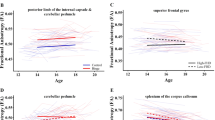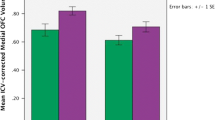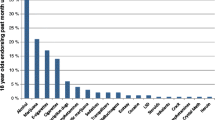Abstract
Background
Half of all new alcohol initiates are between 12 and 17 years old. This is a period of intense neurodevelopment, including changes in functional connectivity patterns among higher-order function areas. It is crucial to understand how alcohol-related neurotoxicity may be influenced by drinking onset age.
Design
This study prospectively examined the effects of age of first drink on frontoparietal context-dependent functional connectivity (cdFC) during a visual working memory task. Youth 13.5 years of age (SD = 1.2) underwent a neuropsychological and neuroimaging session before drinking initiation and at follow-up 6 years later. Hierarchical linear regressions examined if youth with earlier ages of onset for first and weekly alcohol use showed higher follow-up cdFC between the dorsolateral prefrontal cortex and posterior parietal cortex regions of interest and whole-brain exploratory regions, controlling for pre-drinking cdFC. Higher follow-up cdFC was hypothesized to be correlated with poorer performances in neuropsychological performance.
Results
Exploratory whole-brain analyses showed that, as hypothesized, earlier ages of weekly drinking onset were associated with higher cdFC between the bilateral posterior cingulate and cortical and subcortical areas implicated in attentional processes, which was in turn associated with poorer performance on neuropsychological tasks of attention, ps < .05. No relationship between age of onset and cdFC between the two ROIs were found.
Conclusion
Earlier ages of weekly alcohol use initiation may adversely affect neurodevelopment by reducing developmentally appropriate integration of attentional circuits during a cognitive challenge. Delaying the onset of weekly alcohol use patterns well after early adolescence may reduce the risk for harm of alcohol use on the brain.




Similar content being viewed by others
References
Achenbach T, Rescorla L (2003) Manual for the ASEBA adult forms & profiles. University of Vermont, Burlington, VT
Achenbach TM (1991) Manual for the child behavior checklist/4-18 and 1991 profile. University of Vermont Burlington, VT, Department of Psychiatry
American Psychiatric Association (2000) Diagnostic and Statistical Manual of Mental Disorders 4th ed., text revision edn., Washington, DC
Bandettini PA, Jesmanowicz A, Wong EC, Hyde JS (1993) Processing strategies for time-course data sets in functional MRI of the human brain. Magn Reson Med 30:161–173. https://doi.org/10.1002/mrm.1910300204
Barber AD, Caffo BS, Pekar JJ, Mostofsky SH (2013) Developmental changes in within- and between-network connectivity between late childhood and adulthood. Neuropsychologia 51(1):156–167. https://doi.org/10.1016/j.neuropsychologia.2012.11.011
Benjamini Y, Hochberg Y (1995) Controlling the false discovery rate: a practical and powerful approach to multiple testing. J R Stat Soc Ser B Methodol 57:289–300
Boly M, Moran R, Murphy M, Boveroux P, Bruno MA, Noirhomme Q, Ledoux D, Bonhomme V, Brichant JF, Tononi G, Laureys S, Friston K (2012) Connectivity changes underlying spectral EEG changes during propofol-induced loss of consciousness. J Neurosci 32(20):7082–7090. https://doi.org/10.1523/jneurosci.3769-11.2012
Brown SA, Myers MG, Lippke L, Tapert SF, Stewart DG, Vik PW (1998) Psychometric evaluation of the Customary Drinking and Drug Use Record (CDDR): a measure of adolescent alcohol and drug involvement. J Stud Alcohol 59:427–438. https://doi.org/10.15288/jsa.1998.59.427
Cabeza R, Ciaramelli E, Olson IR, Moscovitch M (2008) The parietal cortex and episodic memory: an attentional account. Nat Rev Neurosci 9(8):613–625. https://doi.org/10.1038/nrn2459
Cahalan D, Cisin IH, Crossley HM (1969) American drinking practices: a national study of drinking behavior and attitudes. Monographs of the Rutgers Center of Alcohol Studies
Campanella S, Peigneux P, Petit G, Lallemand F, Saeremans M, Noël X, Metens T, Nouali M, de Tiège X, de Witte P, Ward R, Verbanck P (2013) Increased cortical activity in binge drinkers during working memory task: a preliminary assessment through a functional magnetic resonance imaging study. PLoS One 8(4):e62260. https://doi.org/10.1371/journal.pone.0062260
Cavanna AE, Trimble MR (2006) The precuneus: a review of its functional anatomy and behavioural correlates. Brain 129(3):564–583. https://doi.org/10.1093/brain/awl004
Chafee MV, Goldman-Rakic PS (2000) Inactivation of parietal and prefrontal cortex reveals interdependence of neural activity during memory-guided saccades. J Neurophysiol 83(3):1550–1566. https://doi.org/10.1152/jn.2000.83.3.1550
Chai XJ, Ofen N, Gabrieli JD, Whitfield-Gabrieli S (2014) Selective development of anticorrelated networks in the intrinsic functional organization of the human brain. J Cogn Neurosci 26(3):501–513. https://doi.org/10.1162/jocn_a_00517
Chandler LJ (2003) Ethanol and brain plasticity: receptors and molecular networks of the postsynaptic density as targets of ethanol. Pharmacol Ther 99(3):311–326. https://doi.org/10.1016/S0163-7258(03)00096-2
Chen G, Chen G, Xie C, Li SJ (2011) Negative functional connectivity and its dependence on the shortest path length of positive network in the resting-state human brain. Brain connectivity 1(3):195–206. https://doi.org/10.1089/brain.2011.0025
Cohen JD, Perlstein WM, Braver TS, Nystrom LE, Noll DC, Jonides J, Smith EE (1997) Temporal dynamics of brain activation during a working memory task. Nature 386(6625):604–608. https://doi.org/10.1038/386604a0
Corbetta M, Shulman GL (2002) Control of goal-directed and stimulus-driven attention in the brain. Nat Rev Neurosci 3(3):201–215. https://doi.org/10.1038/nrn755
Cox RW, Jesmanowicz A (1999) Real-time 3D image registration for functional MRI. Magn Reson Med 42(6):1014–1018
Crews FT, Mdzinarishvili A, Kim D, He J, Nixon K (2006) Neurogenesis in adolescent brain is potently inhibited by ethanol. Neuroscience 137(2):437–445. https://doi.org/10.1016/j.neuroscience.2005.08.090
Crews FT, Vetreno RP, Broadwater MA, Robinson DL (2016) Adolescent alcohol exposure persistently impacts adult neurobiology and behavior. Pharmacol Rev 68(4):1074–1109. https://doi.org/10.1124/pr.115.012138
Crone EA, Wendelken C, Donohue S, van Leijenhorst L, Bunge SA (2006) Neurocognitive development of the ability to manipulate information in working memory. Proc Natl Acad Sci 103(24):9315–9320. https://doi.org/10.1073/pnas.0510088103
De Bellis MD, Clark DB, Beers SR, Soloff PH, Boring AM, Hall J, Kersh A, Keshavan MS (2000) Hippocampal volume in adolescent-onset alcohol use disorders. Am J Psychiatry 157(5):737–744. https://doi.org/10.1176/appi.ajp.157.5.737
Delis DC, Kaplan E, Kramer JH (2001) The Delis-Kaplan Executive Function System: examiner’s manual. The Psychological Corporation, San Antonio, TX
Delis DC, Kramer JH, Kaplan E, Ober BA (2000) California Verbal Learning Test\. The Psychological Corporation, San Antonio, TX
Demir B, Ulug BD, Ergun EL, Erbas B (2002) Regional cerebral blood flow and neuropsychological functioning in early and late onset alcoholism. Psychiatry Res Neuroimaging 115(3):115–125. https://doi.org/10.1016/S0925-4927(02)00071-9
Doremus TL, Brunell SC, Varlinskaya EI, Spear LP (2003) Anxiogenic effects during withdrawal from acute ethanol in adolescent and adult rats. Pharmacol Biochem Behav 75(2):411–418. https://doi.org/10.1016/S0091-3057(03)00134-5
Falk DE, Yi HY, Hilton ME (2008) Age of onset and temporal sequencing of lifetime DSM-IV alcohol use disorders relative to comorbid mood and anxiety disorders. Drug Alcohol Depen 94(1-3):234–245. https://doi.org/10.1016/J.Drugalcdep.2007.11.022
Finn PR, Rickert ME, Miller MA, Lucas J, Bogg T, Bobova L, Cantrell H (2009) Reduced cognitive ability in alcohol dependence: examining the role of covarying externalizing psychopathology. J Abnorm Psychol 118(1):100–116. https://doi.org/10.1037/a0014656
Fox MD, Snyder AZ, Vincent JL, Corbetta M, Van Essen DC, Raichle ME (2005) The human brain is intrinsically organized into dynamic, anticorrelated functional networks. Proc Natl Acad Sci U S A 102(27):9673–9678. https://doi.org/10.1073/pnas.0504136102
Friston KJ, Buechel C, Fink GR, Morris J, Rolls E, Dolan RJ (1997) Psychophysiological and modulatory interactions in neuroimaging. NeuroImage 6(3):218–229. https://doi.org/10.1006/nimg.1997.0291
Gitelman DR, Penny WD, Ashburner J, Friston KJ (2003) Modeling regional and psychophysiologic interactions in fMRI: the importance of hemodynamic deconvolution. NeuroImage 19(1):200–207. https://doi.org/10.1016/S1053-8119(03)00058-2
Gogtay N, Giedd JN, Lusk L, Hayashi KM, Greenstein D, Vaituzis AC, Nugent TF, Herman DH, Clasen LS, Toga AW, Rapoport JL, Thompson PM (2004) Dynamic mapping of human cortical development during childhood through early adulthood. Proc Natl Acad Sci 101(21):8174–8179. https://doi.org/10.1073/pnas.0402680101
Grant JD et al (2005) Adolescent alcohol use is a risk factor for adult alcohol and drug dependence: evidence from a twin design. Psychol Med 36(01):109–118. https://doi.org/10.1017/S0033291705006045
Greenough WT, Black JE, Wallace CS (1987) Experience and brain-development. Child Dev 58(3):539–559. https://doi.org/10.1111/j.1467-8624.1987.tb01400.x
Hampshire A, Chamberlain SR, Monti MM, Duncan J, Owen AM (2010) The role of the right inferior frontal gyrus: inhibition and attentional control. NeuroImage 50(3):1313–1319. https://doi.org/10.1016/j.neuroimage.2009.12.109
Hampson M, Driesen NR, Skudlarski P, Gore JC, Constable RT (2006) Brain connectivity related to working memory performance. J Neurosci 26(51):13338–13343. https://doi.org/10.1523/jneurosci.3408-06.2006
Hawkins JD, Graham JW, Maguin E, Abbott R, Hill KG, Catalano RF (1997) Exploring the effects of age of alcohol use initiation and psychosocial risk factors on subsequent alcohol misuse. J Stud Alcohol 58(3):280–290. https://doi.org/10.15288/jsa.1997.58.280
Herting MM, Fair D, Nagel BJ (2011) Altered fronto-cerebellar connectivity in alcohol-naive youth with a family history of alcoholism. NeuroImage 54(4):2582–2589. https://doi.org/10.1016/j.neuroimage.2010.10.030
Isbell E, Fukuda K, Neville HJ, Vogel EK (2015) Visual working memory continues to develop through adolescence. Front Psychol 6:696. https://doi.org/10.3389/fpsyg.2015.00696
Jo HJ, Saad ZS, Simmons WK, Milbury LA, Cox RW (2010) Mapping sources of correlation in resting state FMRI, with artifact detection and removal. NeuroImage 52(2):571–582. https://doi.org/10.1016/j.neuroimage.2010.04.246
Johnston LD, O'Malley PM, Miech RA, Bachman JG, Schulenberg JE (2017) Monitoring the future national survey results on drug use, 1975–2016: overview, key findings on adolescent drug use. Institute for Social Research, The University of Michigan, Ann Arbor
Kelly AMC, Uddin LQ, Biswal BB, Castellanos FX, Milham MP (2008) Competition between functional brain networks mediates behavioral variability. NeuroImage 39(1):527–537. https://doi.org/10.1016/j.neuroimage.2007.08.008
Kessler RC, Crum RM, Warner LA, Nelson CB, Schulenberg J, Anthony JC (1997) Lifetime co-occurrence of DSM-III-R alcohol abuse and dependence with other psychiatric disorders in the national comorbidity survey. Arch Gen Psychiatry 54(4):313–321. https://doi.org/10.1001/archpsyc.1997.01830160031005
Lewis R, Rennick P (1979) Manual for the repeatable cognitive-perceptual-motor battery. Axon, Gross Point, MI
Lipari RN, Williams MR, Copello EAP, Pemberton MR (2016) Risk and protective factors and estimates of substance use initiation: results from the 2015 national survey on drug use and health. NSDUH Data Review
Luck SJ, Vogel EK (1997) The capacity of visual working memory for features and conjunctions. Nature 390(6657):279–281. https://doi.org/10.1038/36846
Maurage P, Bestelmeyer PE, Rouger J, Charest I, Belin P (2013) Binge drinking influences the cerebral processing of vocal affective bursts in young adults. NeuroImage 3:218–225. https://doi.org/10.1016/j.nicl.2013.08.010
Medina KL, Nagel BJ, Park A, McQueeny T, Tapert SF (2007) Depressive symptoms in adolescents: associations with white matter volume and marijuana use. J Child Psychol Psychiatry 48(6):592–600. https://doi.org/10.1111/j.1469-7610.2007.01728.x
Morris SA, Eaves DW, Smith AR, Nixon K (2010) Alcohol inhibition of neurogenesis: a mechanism of hippocampal neurodegeneration in an adolescent alcohol abuse model. Hippocampus 20:596–607. https://doi.org/10.1002/hipo.20665
Newson R (2003) Multiple-test procedures and smile plots. Stata J 3:109–132
Nguyen-Louie TT, Castro N, Matt GE, Squeglia LM, Brumback T, Tapert SF (2015) Effects of emerging alcohol and marijuana use behaviors on adolescents’ neuropsychological functioning over four years. J Stud Alcohol Drugs 76(5):738–748. https://doi.org/10.15288/jsad.2015.76.738
Nguyen-Louie TT, Courtney KE, Squeglia LM, Bagot K, Eberson S, Migliorini R, Alcaraz AR, Tapert SF, Pulido C (2017) Prospective changes in neural alcohol cue reactivity in at-risk adolescents. Brain imaging and behavior. https://doi.org/10.1007/s11682-017-9757-0
Østby Y, Tamnes CK, Fjell AM, Westlye LT, Due-Tønnessen P, Walhovd KB (2009) Heterogeneity in subcortical brain development: a structural magnetic resonance imaging study of brain maturation from 8 to 30 years. J Neurosci 29(38):11772–11782. https://doi.org/10.1523/jneurosci.1242-09.2009
Paulus MP, Tapert SF, Pulido C, Schuckit MA (2006) Alcohol attenuates load-related activation during a working memory task: relation to level of response to alcohol. Alcohol Clin Exp Res 30(8):1363–1371. https://doi.org/10.1111/j.1530-0277.2006.00164.x
Pechansky F, Szobot CM, Scivoletto S (2004) Alcohol use among adolescents: concepts, epidemiological characteristics and etiopatogenic factors. Revista Brasileira de Psiquiatria 26:14-17 doi:/S1516-44462004000500005
Peeters M, Monshouwer K, Janssen T, Wiers RW, Vollebergh WAM (2014) Working memory and alcohol use in at-risk adolescents: a 2-year follow-up. Alcohol Clin Exp Res 38:1176–1183 doi:10.1111/acer.12339
Rey A, Osterrieth PA (1993) Translations of excerpts from Andre Rey's "Psychological examination of traumatic encephalopathy" and P.A. Osterrieth's "The complex figure copy test" vol 7. Clin Neuropsychol
Rohde P, Lewinsohn PM, Seeley JR (1996) Psychiatric comorbidity with problematic alcohol use in high school students. J Am Acad Child Adolesc Psychiatry 35(1):101–109. https://doi.org/10.1097/00004583-199601000-00018
SAMHSA (2013) Results from the 2012 National Survey on Drug Use and Health: summary of national findings. NSDUH Series H-46, HHS Publication No. (SMA) 13-4795. Rockville, MD: Substance Abuse and Mental Health Services Administration
Schweinsburg AD, Schweinsburg BC, Nagel BJ, Eyler LT, Tapert SF (2011) Neural correlates of verbal learning in adolescent alcohol and marijuana users. Addiction 106(3):564–573. https://doi.org/10.1111/j.1360-0443.2010.03197.x
Shokri-Kojori E, Tomasi D, Wiers CE, Wang GJ, Volkow ND (2016) Alcohol affects brain functional connectivity and its coupling with behavior: greater effects in male heavy drinkers. Mol Psychiatry 22(8):1185–1195. https://doi.org/10.1038/mp.2016.25
Shrier LA, Emans J, Woods ER, DuRant RH (1997) The association of sexual risk behaviors and problem drug behaviors in high school students. J Adolesc Health 20(5):377–383. https://doi.org/10.1016/S1054-139x(96)00180-2
Shulman GL, Astafiev SV, Franke D, Pope DL, Snyder AZ, McAvoy MP, Corbetta M (2009) Interaction of stimulus-driven reorienting and expectation in ventral and dorsal frontoparietal and basal ganglia-cortical networks. J Neurosci 29(14):4392–4407. https://doi.org/10.1523/jneurosci.5609-08.2009
Silveri MM, Spear LP (1998) Decreased sensitivity to the hypnotic effects of ethanol early in ontogeny. Alcohol Clin Exp Res 22(3):670–676. https://doi.org/10.1111/j.1530-0277.1998.tb04310.x
Singh-Curry V, Husain M (2009) The functional role of the inferior parietal lobe in the dorsal and ventral stream dichotomy. Neuropsychologia 47(6):1434–1448. https://doi.org/10.1016/j.neuropsychologia.2008.11.033
Sobell L, Sobell M (1992) Timeline Follow-Back. In: Litten R, Allen J (eds) Measuring alcohol consumption. Humana Press, pp 41–72. https://doi.org/10.1007/978-1-4612-0357-5_3
Sobell LC, Maisto SA, Sobell MB, Cooper AM (1979) Reliability of alcohol abusers’ self-reports of drinking behavior. Behav Res Ther 17(2):157–160. https://doi.org/10.1016/0005-7967(79)90025-1
Somerville LH (2016) Searching for signatures of brain maturity: what are we searching for? Neuron 92(6):1164–1167. https://doi.org/10.1016/j.neuron.2016.10.059
Spadoni AD, Simmons AN, Yang TT, Tapert SF (2013) Family history of alcohol use disorders and neuromaturation: a functional connectivity study with adolescents. Am J Drug Alcohol Abuse 39(6):356–364. https://doi.org/10.3109/00952990.2013.818680
Squeglia LM, Schweinsburg AD, Pulido C, Tapert SF (2011) Adolescent binge drinking linked to abnormal spatial working memory brain activation: differential gender effects. Alcohol Clin Exp Res 35(10):1831–1841. https://doi.org/10.1111/j.1530-0277.2011.01527.x
Squeglia LM, Spadoni AD, Infante MA, Myers MG, Tapert SF (2009) Initiating moderate to heavy alcohol use predicts changes in neuropsychological functioning for adolescent girls and boys. Psychol Addict Behav 23(4):715–722. https://doi.org/10.1037/a0016516
Stevens MC, Pearlson GD, Calhoun VD (2009) Changes in the interaction of resting-state neural networks from adolescence to adulthood. Hum Brain Mapp 30(8):2356–2366. https://doi.org/10.1002/hbm.20673
Strauss E, Sherman EM, Spreen O (2006) A compendium of neuropsychological tests: administration, norms, and commentary. American Chemical Society
Talairach J, Tournoux P (1988) Three-dimensional coplanar stereotaxic atlas of the human brain proportional system: an approach to cerebral imaging. Thieme, New York
Tapert SF, Schweinsburg AD, Barlett VC, Brown SA, Frank LR, Brown GG, Meloy MJ (2004) Blood oxygen level dependent response and spatial working memory in adolescents with alcohol use disorders. Alcohol Clin Exp Res 28(10):1577–1586. https://doi.org/10.1097/01.Alc.0000141812.81234.A6
Thiel CM, Zilles K, Fink GR (2004) Cerebral correlates of alerting, orienting and reorienting of visuospatial attention: an event-related fMRI study. NeuroImage 21:318–328. https://doi.org/10.1016/j.neuroimage.2003.08.044
Varlinskaya EI, Spear LP (2002) Acute effects of ethanol on social behavior of adolescent and adult rats: role of familiarity of the test situation. Alcohol Clin Exp Res 26(10):1502–1511. https://doi.org/10.1097/01.alc.0000034033.95701.e3
Wager TD, Smith EE (2003) Neuroimaging studies of working memory: a meta-analysis. Cogn Affect Behav Neurosci 3(4):255–274. https://doi.org/10.3758/Cabn.3.4.255
Wechsler D (1997) Wechsler Adult Intelligence Scale, 3rd edn. The Psychological Corporation, New York
Wechsler D (1999) Wechsler Abbreviated Scale of Intelligence. The Psychological Corporation, San Antonio, TX
Weissman DG et al (2015) Earlier adolescent substance use onset predicts stronger connectivity between reward and cognitive control brain networks. Dev Cogn Neurosci 16:121–129. https://doi.org/10.1016/j.dcn.2015.07.002
Wetherill RR, Bava S, Thompson WK, Boucquey V, Pulido C, Yang TT, Tapert SF (2012) Frontoparietal connectivity in substance-naive youth with and without a family history of alcoholism. Brain Res 1432:66–73. https://doi.org/10.1016/j.brainres.2011.11.013
Wetherill RR, Castro N, Squeglia LM, Tapert SF (2013) Atypical neural activity during inhibitory processing in substance-naive youth who later experience alcohol-induced blackouts. Drug Alcohol Depen 128(3):243–249. https://doi.org/10.1016/j.drugalcdep.2012.09.003
White AM, Truesdale MC, Bae JG, Ahmad S, Wilson WA, Best PJ, Swartzwelder HS (2002) Differential effects of ethanol on motor coordination in adolescent and adult rats. Pharmacol Biochem Behav 73(3):673–677. https://doi.org/10.1016/S0091-3057(02)00860-2
Zhou Y, Liang M, Jiang T, Tian L, Liu Y, Liu Z, Liu H, Kuang F (2007) Functional dysconnectivity of the dorsolateral prefrontal cortex in first-episode schizophrenia using resting-state fMRI. Neurosci Lett 417(3):297–302. https://doi.org/10.1016/j.neulet.2007.02.081
Acknowledgements
The authors thank the participants, family, and other informants; the San Diego Unified School District; and the outstanding research staff: Norma Castro, Claudia Cota, and Irene Lee. This study was supported by National Institute on Alcohol Abuse and Alcoholism Grants R01 AA13419, U01 AA021695 (PI: Tapert), T32 AA013525 (PI: Riley), and F31 AA024389 (PI: Nguyen-Louie).
Author information
Authors and Affiliations
Corresponding author
Rights and permissions
About this article
Cite this article
Nguyen-Louie, T.T., Simmons, A.N., Squeglia, L.M. et al. Earlier alcohol use onset prospectively predicts changes in functional connectivity. Psychopharmacology 235, 1041–1054 (2018). https://doi.org/10.1007/s00213-017-4821-4
Received:
Accepted:
Published:
Issue Date:
DOI: https://doi.org/10.1007/s00213-017-4821-4




